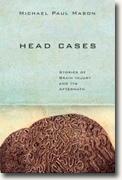Head Cases
Michael Paul Mason
book reviews:
· general fiction
· chick lit/romance
· sci-fi/fantasy
· graphic novels
· nonfiction
· audio books
· author interviews
· children's books @
curledupkids.com
· DVD reviews @
curledupdvd.com
newsletter
win books
buy online
links
home
for authors
& publishers
for reviewers

 |
Head Cases: Stories of Brain Injury and Its Aftermath Michael Paul Mason Farrar, Strauss & Giroux Hardcover 320 pages April 2008 |
|
Michael Paul Mason is a case manager who deals with head injury cases. He's also a writer. A portion of the proceeds of this book will go to the Brain Injury Association of America.
Take Rob, for instance. He was so badly injured in a car crash as a teenager that the first person who greeted his mother at the hospital was a priest. Rob wound up in a wheelchair, but he didn't lose any cognitive functioning. For a time he was "locked-in": "Survivors have called locked-in-syndrome the waking nightmare, and most of them do not emerge from the condition." In the locked-in state, "the individual remains alert and cognitively intact but has no ability to control body movement or function." Rob could communicate only by opening and closing his eyes. His mother capitalized on this one sign of hope, forcing Rob to spell out words with a series of blinks. It gradually brought him into fuller functioning and gave therapists a justification for working with him. One odd result of his brain injury: Rob cannot cry. Mason makes it clear that one of the major stumbling blocks for brain-injured people is that very little treatment exists at a level they can afford. A likable young man named Cheyenne who was injured while snow-boarding developed debilitating seizures as a result. He now lives as a near-street person, unable to afford assessment and therapy at an epilepsy clinic whose research and treatment is tailor-made for his condition. His recovery to this point has all but bankrupted his parents; Cheyenne has no means of earning a living himself except on a temporary basis because of the cataclysmic seizures that afflict him. Julie is a tragic case of total memory loss from brain injury. She has to write elaborate notes to herself just to get through the day and experiences everything as though it were happening for the first time. She knows, but does not actually remember, that she once had a daughter who was killed in the same auto crash that took her memory, and she knows that she has but cannot live with a husband, for whom the strain of past events has been almost too much to bear. Julie herself would commit suicide except for her strong religious beliefs. The book is filled with stories that will send you into your nearest church to pray, if you are a religious type, that such things will never ever happen to your family. A man gets a fever blister and winds up believing he's dead, so wildly disoriented at times that he even attacks his own child with a knife. A strong, competent Cherokee man falls while carrying a load of logs and begins to have dissociative episodes that gradually tear his once happy, orderly life apart. A little boy becomes so defiant that his parents can't control him because of brain tumor that will alter his life permanently. One of the more uplifting cases described by Mason is of Asya, a Russian woman whose childhood bicycling accident led to a loss of memory and other cognitive deficits. However, it seems to have opened the doors to her artistic capabilities. Asya is a photographer. "Academic study bolstered Asya's mental agility, but one look around her apartment tells you that her art is her salvation." Her moods are more visible than those of ordinary people, and her many self-portraits reveal the soul of this complicated women who suffered for many years in the attempt to make good use of a disabled brain. Mason has given a voice to people like Asya, Rob and Cheyenne, and with the stories he includes the science, and the frustrating inner workings of a system that offers little real hope for people with brain injuries. This book is campaign, placard, and soapbox. Reading it, you will want to join the movement. Originally published on Curled Up With A Good Book at www.curledup.com. © Barbara Bamberger Scott, 2008 |
|
|
|
 Click here to learn more about this month's sponsor! |
|
| fiction · sf/f · comic books · nonfiction · audio newsletter · free book contest · buy books online review index · links · · authors & publishers reviewers |
|
| site by ELBO Computing Resources, Inc. | |
 Mason
is based in Tulsa, but he travels widely to talk to people with brain injuries.
Sometimes that's hard - not the traveling part but the talking part. As Mason
makes clear in this brilliant if harrowing examination of what happens when a
brain gets hurt, any injury may cause any function of the body to go awry, be
changed, or lost forever.
Mason
is based in Tulsa, but he travels widely to talk to people with brain injuries.
Sometimes that's hard - not the traveling part but the talking part. As Mason
makes clear in this brilliant if harrowing examination of what happens when a
brain gets hurt, any injury may cause any function of the body to go awry, be
changed, or lost forever.